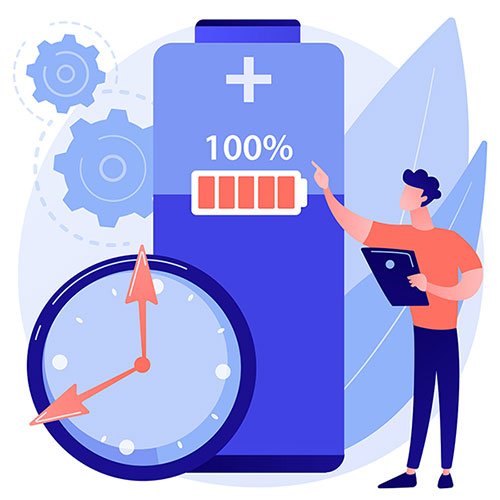One of the worst power crises happened in February 2021 when severe winter storms hit the state of Texas. It left more than 4.5 million homes and businesses without grid power, and it took several days to restore it completely. As you can imagine, many people relied heavily on generators during that time, especially in essential facilities. Power outages that you experience may not be this dramatic. However, it’s still important to know how long can a generator run continuously and whether you can rely on it even in more serious situations.
How Long Can You Run a Generator Continuously?
A generator can run continuously from 5 to 500 hours. But this is a wide range and not very helpful. Several factors contribute to the amount of time you can keep your generator on. The most important is fuel consumption or how efficient your generator is. This depends on the generator’s type and size and the fuel used.
Besides efficiency, other factors that influence runtime are load or how much power you are using. Additionally, oil and when it needs to be refilled. And finally, the heat that’s produced during operation.
When all of these factors are taken into account, you can estimate how long you can run your generator. To do this, look at the generator’s fuel capacity and divide this number by the fuel consumption rate. Generator manufacturers usually provide this information. So you’ll be able to estimate the running time provided by the manufacturer in the user manual.
Regarding averages per fuel type, you can expect 6 to 12 hours from gasoline generators. About 150 to 200 hours from propane generators. And around 3 weeks for natural gas generators.
It’s important to note that no generator can run indefinitely. Yes, there are those which can run 24 hours and more. But all units need a maintenance check from time to time. Let’s look into every generator and type of fuel and consider the factors mentioned earlier.

Portable vs. Standby Generator Running Time
The basic differences between portable and standby generators are that the former can be transported, are usually less powerful, and need to be manually turned on when necessary. The latter is permanently installed, fixed in place, and turned on automatically when the power goes out. Here are the most important facts about their run time.
How Long Can Standy Generators Run?
Standby generators usually have a wattage range between 7000 to 30000 watts. They are stationary backup units that run on propane or natural gas. Both of these fuel types function differently than gasoline and diesel, mainly because there is no built-in fuel tank. Propane comes in a tank of its own. While natural gas is conducted to a generator via a natural gas line, making the fuel source unlimited.
When it comes to propane, you can expect anywhere between 150 and 200 hours of operation. After which you’ll need to check the engine oil and deal with generator cooling. As for natural gas, they can provide continuous power for around 500 hours, or 21 days. After which you should take a break for an oil and temperature check.
If you decide to run your generator for extended periods, make sure you plan in time for changing the oil filters and making sure everything is working properly before you continue.
How Long Can a Portable Generator Run?
On the other hand, portable generators are usually smaller ranging from 1000 to 12000 watts. Portable generators can run on gasoline, propane, and diesel, meaning they typically have a fuel tank. The built-in tanks are limited in size compared to standby generators. This means that you’ll have portable power for a shorter time.
Another type worth mentioning is inverter generators. What sets them apart from standard portable generators is that they adjust their power according to the output needs. When less power output is required, they throttle down. Vice versa, when you need more electricity, they rev up. This characteristic makes them economical, but it’s also difficult to say how long they can run. Although portable inverter generators usually hold smaller fuel tanks, you can generally still expect 5 to 12 hours from these units.
Diesel vs. Propane vs. Gas Generator Runtime

Portable gasoline generators can run anywhere between 5 to 12 hours, sometimes even less. But there are some models, which due to their larger gas tanks, can run 14 and 18 hours.
As for diesel generators, their fuel tanks are usually slightly larger. So you’ll be able to find models which work up to 72 hours. Although most of them can run for 24 hours.
You can also run a portable generator on propane, which is the case if you have a dual fuel generator. Since propane comes in a propane tank, the run time will depend on the size of the tank, oil change schedule, and heat. Let’s explain.
You can get propane in tanks of different sizes (20, 100, 500, etc.). Or you can prolong the generator’s run time by connecting two propane tanks to a gas line with a regulator. In theory, you could constantly switch out empty tanks for full ones, but the reality is a bit different.
With all this in mind, portable propane generators can run around 5 to 8 hours on a 20 lb tank. About 16 to 20 hours on a 50 lb tank. And if you decide to get a bigger tank or connect two of them together, you can get 150 to 200 hours, or around a week of backup power.
Besides fuel, a diesel, gas, or propane generator also needs oil to function. After approximately 100 hours of operation, the oil must be replaced to continue. Besides this, you will also need to ensure your portable generator is running at an optimal temperature since overheating can lead to permanent damage.
An Overview of Generator’s Runtime by Fuel Type
We know many variables that influence how long you can run your generator. We covered various generator types and their run time while mentioning that the type of fuel is just as crucial for the run time as how much fuel there is. Here’s an overview of maximum runtime ranges by fuel type:
- Gasoline: 5 to 12 hours (maximum of 18 hours)
- Diesel: most generators run for 24 hours, but you can find those that will last 48 or even 72 hours
- Propane: from 150 to 200 hours
- Natural gas: 500 hours
- Solar: 3 to 12 hours*
*Although solar generators don’t use fuel in a conventional sense, you may wonder how long can a solar generator provide power. Not very long, unfortunately (unless you own enough solar panels and batteries). If you have a battery system in place that collects energy during the day and stores it for later use, you can expect your generator to work from 3 to 12 hours.
FAQ
Yes, if the fuel tank is large enough and there’s enough fuel for 8 hours, your portable generator can work during the night. You can find both gasoline and diesel generators that can run overnight and propane and natural gas, which usually have a longer run time.
It is generally not advisable to let a generator operate until it runs out of gas as it can get damaged. Besides that, you also risk damaging appliances which are connected to it. If accidentally a generator runs out of gas, maybe nothing happens, but there is a chance something does.
Refueling a portable generator while running is not advisable, and it’s, in fact, dangerous. While operating, your portable generator will heat up, and putting gas into a hot unit may cause fire or even an explosion. Let your generator cool down for at least 15-20 minutes before refueling.
The ideal generator cool-down time is around 15 minutes. It may depend more or less on various factors such as generator type, fuel, temperature outside, etc. Once the unit is not radiating heat anymore, you can proceed with refueling.
In general, you can run a generator for around 100 hours before checking the oil and filters. Make sure to check the owner’s manual of your generator to learn when you should change the engine oil. This process ensures your safety and prolongs the life expectancy of your generator. Make sure you leave the generator to cool down before an oil change.
No, prolonged use is not necessarily bad for your generator, as long as you follow some basic guidelines. First, follow the instructions manual. If a manufacturer said that prolonged use would damage your generator or specify how long you can run it, then make sure you follow these recommendations. Secondly, every generator needs proper maintenance, meaning oil changes, clean filters, and cooling off after heat build-up. Additionally, you should make sure everything functions properly from time to time. If you notice anything wrong, prolonged use will definitely make matters worse.
An average 5000-watt generator will run for 7 to 13 hours, depending on the type of fuel and load. Some portable generators may run longer due to a larger fuel tank size.
If the tank is full, a 7500-watt generator will run for 6 to 11 hours. Whether the portable generator works on gas, diesel, or liquid propane and the load, all of these can influence the run time.
The run time of a 10000-watt generator is 6 to 12 hours, depending on the fuel type, tank size used, and the amount of power needed.
Although manufacturers offer a 2- or 3 years warranty, you can expect your generator to last much more than 10 to 20 years. In general, generators last anywhere between 1000 and 3000 hours, so the life expectancy of generators varies depending on how much you use them during a year.
Final Thoughts
It’s best to prepare yourself for any situation. Whether you’re going on a camping trip or expecting a power outage, you need to know how long can you run your generator continuously and count on it. Whether you need it for just a few hours or a couple of days, a model is on the market. With a properly maintained generator, you’ll be able to make the best use of it when in need.

